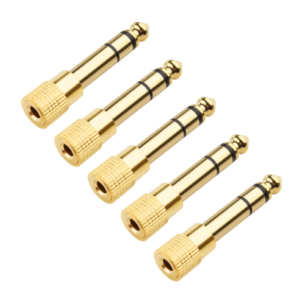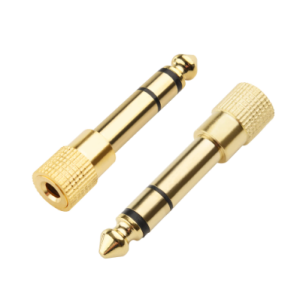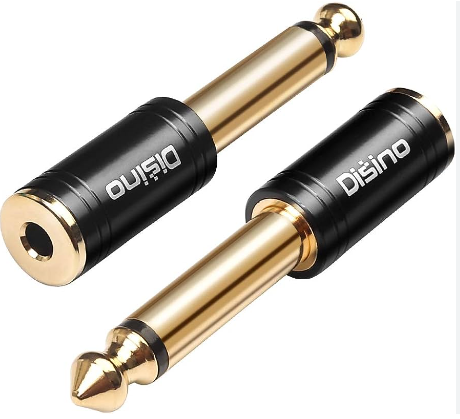1/4 To 1/8 Adapter
In the realm of audio technology, even the smallest components can make a significant difference in the quality of sound. One such unassuming yet crucial component is the 1/4 to 1/8 adapter. This unpretentious device acts as a bridge between different audio equipment, facilitating seamless connectivity and opening the doors to a world of possibilities for audiophiles, musicians, and professionals alike.
Understanding the Role of a 1/4 to 1/8 Adapter:
Before delving into the intricacies of selecting the best 1/4 to 1/8 adapter, it’s essential to grasp its fundamental purpose. The 1/4 to 1/8 adapter, also known as a 6.35mm to 3.5mm adapter, serves as an interface between audio devices with different-sized jacks. The 1/4-inch (6.35mm) jack is commonly found in instruments like electric guitars, amplifiers, and studio equipment, while the 1/8-inch (3.5mm) jack is prevalent in consumer electronics such as smartphones, laptops, and headphones.
This adapter is a miniature marvel that allows you to connect high-end musical instruments to everyday devices or plug professional-grade headphones into portable audio players. It’s a tool that bridges the gap between diverse audio systems, granting users the ability to share, create, and experience sound without limitations.
Key Considerations When Choosing the Best 1/4 to 1/8 Adapter:
Build Quality and Durability:
The reliability of an adapter largely depends on its construction. Opt for adapters crafted from high-quality materials like gold-plated connectors, which enhance conductivity and minimize signal loss. Durable housing materials, such as robust plastics or metal alloys, ensure longevity and protection against wear and tear.

Audio Quality:
One of the primary motivations for investing in a 1/4 to 1/8 adapter is to maintain audio integrity. Look for adapters that boast exceptional signal transmission and noise reduction features. A well-engineered adapter will preserve the richness and nuances of your audio, offering a seamless listening experience.
Compatibility:
While the primary purpose of this adapter is to bridge different jack sizes, it’s crucial to ensure compatibility with your specific devices. Some adapters may have limitations based on the devices they can connect or the type of signals they can handle. Double-check that the adapter you choose supports the intended devices and applications.
Size and Portability:
Portability is a key factor, especially when you’re on the go. Opt for a compact and lightweight adapter that fits comfortably in your bag or pocket. A slim design ensures that you’re always ready to connect your gear without hassle.

Ease of Use:
A well-designed 1/4 to 1/8 adapter should be easy to plug and unplug. A snug fit ensures a secure connection, while smooth insertion and removal prevent any potential damage to your equipment.
Brand Reputation and Reviews:
Research reputable brands known for producing high-quality audio accessories. Reading reviews from other users can provide valuable insights into the performance and durability of a particular adapter model.
Top Contenders for the Best 1/4 to 1/8 Adapters:
Hosa GMP-272 1/4 to 1/8 Adapter:
Hosa is renowned for manufacturing reliable audio accessories, and the GMP-272 is no exception. With its sturdy construction, gold-plated connectors, and excellent signal transmission, this adapter seamlessly connects professional gear to consumer devices.
Monoprice 6.35mm (1/4 Inch) to 3.5mm (1/8 Inch) Headphone Adapter:
Monoprice offers a budget-friendly option without compromising on quality. This adapter is designed for both headphones and instruments, ensuring versatility and optimal audio quality.
Cable Matters 2-Pack 1/4 to 3.5mm Adapter:
If you’re seeking a cost-effective solution without sacrificing performance, Cable Matters has you covered. This adapter comes in a convenient two-pack and features a durable design for various audio applications.
FiiO L9 1/4 to 1/8 Adapter Cable:
FiiO is acclaimed for its audio expertise, and the L9 adapter cable reflects their commitment to quality. With its specialized design, this cable adapter is an excellent choice for audiophiles seeking unparalleled audio fidelity.
StarTech.com 6.35mm to 3.5mm Stereo Audio Adapter:
For those requiring a professional-grade adapter, StarTech.com delivers. This adapter focuses on signal preservation and durability, making it an ideal choice for studio environments and live performances.
Finding the Perfect 1/4″ to 1/8″ Adapter: A Comprehensive Guide
A 1/4″ to 1/8″ adapter is a small yet crucial accessory that bridges the gap between different audio devices, enabling you to connect larger audio equipment with smaller ones. Whether you’re a musician, audio enthusiast, or casual user, selecting the best adapter ensures optimal sound quality and compatibility. This guide outlines essential factors to consider when choosing the ideal 1/4″ to 1/8″ adapter for your needs.
Compatibility:
Ensure the adapter is compatible with your devices. Check if your 1/4″ and 1/8″ jacks are stereo or mono, as using the wrong adapter type can result in distorted sound or poor connectivity.
Build Quality:
Opt for adapters made from durable materials like metal or high-quality plastic. These materials provide better signal transmission and resist wear and tear, ensuring a longer lifespan.
Connector Types:
There are two main types of 1/4″ to 1/8″ adapters: male to female and female to male. Choose the appropriate type based on your specific needs and equipment configuration.
Signal Quality:
Look for gold-plated connectors. Gold plating improves conductivity, reducing signal loss and maintaining audio fidelity. It also helps prevent corrosion over time.
Shielding:
Select an adapter with proper shielding to minimize interference and noise. This is especially important for adapters used in professional audio setups where signal clarity is paramount.
Size and Design:
Consider the adapter’s size and design, especially if you plan to use it in tight spaces. A low-profile design or a right-angle adapter might be preferable in certain situations.
Brand Reputation:
Choose adapters from reputable brands known for their quality audio accessories. Research customer reviews and testimonials to gauge user satisfaction and reliability.
Warranty and Customer Support:
Check if the adapter comes with a warranty or satisfaction guarantee. This indicates the manufacturer’s confidence in their product. Good customer support can also be beneficial if you encounter any issues.
Price:
While cost shouldn’t be the sole determining factor, be cautious of excessively cheap adapters, as they might compromise on build quality and performance. Aim for a balance between affordability and quality.
Specialized Adapters:
Depending on your needs, you might require specialized adapters, such as those with impedance matching for headphones or adapters designed for specific audio equipment. Research and choose accordingly.
Conclusion: Elevate Your Audio Experience with the Right Adapter
In the world of audio connectivity, the 1/4 to 1/8 adapter plays a pivotal role in ensuring seamless interactions between various devices. Whether you’re a musician connecting your instrument to an amplifier, a producer fine-tuning your studio setup, or a casual listener enjoying music on the go, the quality of your adapter matters.
When choosing the best 1/4 to 1/8 adapter for your needs, prioritize factors such as build quality, audio performance, compatibility, portability, ease of use, and brand reputation. The market offers a range of options catering to different budgets and requirements, so take your time to explore and select an adapter that will enhance your audio experience to new heights. With the right adapter in your arsenal, you’ll unlock the true potential of your audio devices and indulge in a world of immersive sound like never before.
FAQs about “Best 1/4 to 1/8 Adapter”
What is a 1/4 to 1/8 adapter, and why might I need one?
A 1/4 to 1/8 adapter is a small audio accessory that allows you to convert a 1/4-inch (6.35mm) audio jack into a 1/8-inch (3.5mm) audio jack, or vice versa. This is useful when you want to connect audio equipment with different-sized jacks, such as using professional headphones with a 1/4-inch plug to a device that only accepts 1/8-inch connections.
How do I choose the best 1/4 to 1/8 adapter for my needs?
When selecting a 1/4 to 1/8 adapter, consider the build quality, materials used, and connector type. Look for adapters with sturdy construction and gold-plated connectors, as they tend to offer better signal quality and durability. Additionally, ensure compatibility with your specific devices and check for user reviews to gauge the performance and reliability of the adapter.
Are there different types of 1/4 to 1/8 adapters available?
Yes, there are various types of 1/4 to 1/8 adapters, including straight adapters, angled adapters, and stereo/mono adapters. Straight adapters simply convert the plug sizes, while angled adapters are designed to reduce strain on the cable when connecting devices at an angle. Stereo/mono adapters can also be useful for adjusting the audio signal type based on your equipment’s requirements.
Will using a 1/4 to 1/8 adapter affect audio quality?
In general, using a high-quality 1/4 to 1/8 adapter should not significantly impact audio quality. However, the overall audio experience might be influenced by factors such as the quality of the adapter’s connectors, the length and quality of the cables being used, and the devices you’re connecting. Using well-built adapters with gold-plated connectors can help minimize potential signal degradation.
Can I use a 1/4 to 1/8 adapter for both headphones and microphones?
Yes, you can use a 1/4 to 1/8 adapter for both headphones and microphones, as long as they have the appropriate plugs. Keep in mind that the adapter’s compatibility with microphones might depend on the microphone type (condenser, dynamic, etc.) and its specific requirements. It’s recommended to ensure compatibility and consider any impedance or signal level differences that might arise when adapting microphone connections.
